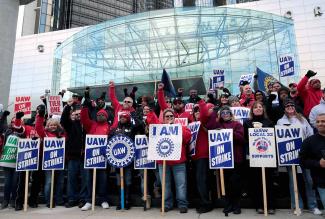Battle Against Big 3: UAW Strike May Become A Redefining Moment for Labour Movement in US
In an overwhelming majority, the United States based automobile trade union - the United Auto Workers (UAW) voted on August 25 to authorize a strike action against Detroit’s big three automobile companies if they fail to offer a competitive contract by the time the current agreement expires on September 14. Ford, General Motors, and Stellantis, which had been facing rising productivity and profit for decades had refused to provide proper wages to the workers. The unions have decided that if they fail to rectify all work will be stopped on September 14.
The strike action was approved by 97 percent of the 150,000 workers who are part of UAW. Their demands for new contract include a 32-hour workweek and pay raises (Increase wages by 46% over four years) in conjunction with inflation. UAW noted that several workers were forced to work for grueling 10-hour shifts.
“I’ve been told throughout that we’ve set expectations too high. You’re damn right we have, because our members have high expectations, and record profits deserve record contracts,” said UAW President Shawn Fain at the rally. “As a union, we have to lead the fight for economic justice—not just for ourselves but for the entire working class.”
As per the reports, the Ford, General Motors and Stellantis made a combined $21 billion in profits in just the first six months of this year.
Another major demand is the end of two-tier system, a type of payroll system in which one group of workers receive lower wages and/or employee benefits than another for same work. It is a form of contractual system that we witness in India or several South Asian countries.
Furthermore, the union has demanded for establishment of a defined pension benefit for all workers, reinstatement of retiree medical benefits, ensuring the right to strike over plant closures, creation of a working family protection program and make all temporary workers permanent among others.
A Paradigm Shift in Working Class Movement in the US
It is important to note that, though one of the biggest automobile unions in US, UAW had never engaged in any direct action or campaign in decades against the rampant labour exploitation in Big 3. The last major militant movement spearheaded by UAW was in 1930s and 1940s under the leadership of communists. The anti-communist Mccarthyism or Red Scare of 1940s/ 50s and the Reagan administration’s crackdown on the Professional Air Traffic Controllers Organization (PATCO) strike in 1981 severely weakened the militancy in the trade union movements.
Later, in the case of UAW, the union had not only refused to take ahead the demands of the working class, but several of the hard earned rights of the workers like the cost-of-living adjustment (COLA) were given away.
But in recent years, with the rise in militant trade union movement in the US and growing resentment among the workers led to a paradigm shift in the UAW, which was forced to revamp itself and move towards radical class movement. The election of Shawn Fain was one big step towards this.
“This is the first time in UAW history that the members saw what the union was asking for in negotiations,” District 1 Director LaShawn English told the crowd, drawing tremendous applause.
The call to strike action by UAW is being witnessed at a time when the working class in the US are becoming more militant, breaking the chains of compromise that many union leaders had placed. The strike action will further solidify and strengthen the labour movement landscape in the country, a spectate that is haunting the corporates and the government. The ongoing Screen Actors Guild and American Federation of Television and Radio Artists (SAG-AFTRA) and the Writer’s Guild of America strikes, a UPS strike authorization that resulted in a better contract, and a railway strike plan that thwarted by the government in December are some of the recent strike actions in the US.
“We used to be the industry standard when it came to contract negotiations and raises,” said Jesse Ramirez, President of UAW Local 230. “Our wages were among the highest in all the industries, and we’re pretty much down towards the bottom again… it’s pretty disheartening to our members. For our members, that number one thing is raises. They really would like to see a double digit increase in their raises.”
These all-strike actions are not just about the demands of fair pay and work hours, the working class is uninamously calling upon companies to ensure workers voices in the decision making, especially in the on-going rapid investment and deployment of new technologies, including Artificial Intelligence (AI) that will have severe impact on the workers.
The UAW is preparing all out for the possible and protracted strike action beginning on September 14. The union said that UAW Strike Fund would provide partial financial support to striking workers, who would lose their pay during the action.
The renewed thrust being witnessed in the militant labour movement in the US, along with the possible UAW strike can be a redefining moment for the working class in the country. Clearly, the old chains of compromise and collaborations with the capitalist bosses are being broken. Surely, the paths and outcomes of the UAW’s proposed strike will have a major impact on the class struggle scenario in the US.

